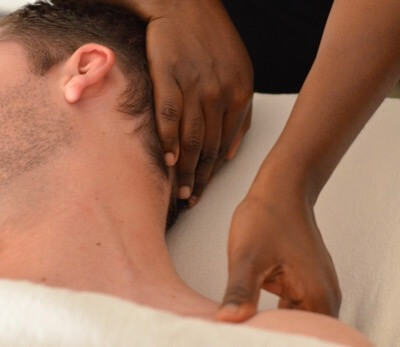- Home
- Benefits of Massage
- Choosing a Massage Therapist
As an affiliate with Bookshop, Amazon, and other programs, I may earn revenue from qualifying purchases through affiliate links. This does not affect the price you pay. Privacy Policy / Disclosures. This site is for educational purposes only.
Search this site:
Choosing a Massage Therapist Who Is Right for You
You're ready for a massage. How do you go about choosing a massage therapist and what type of massage to receive?
First, know why you want a massage in order to find the type of massage therapist who can give you the results you want. While there are no official classifications of different types of massage therapist, general categories include relaxation, injury treatment, sports massage, structural or postural bodywork, and medical or clinical.

Within those categories, massage therapist may offer a variety of types of massage. Often, the type of massage is far less important than the skill and intention of the therapist.
Common reasons for wanting a massage include:
- You feel sluggish and want to recharge your body.
- You are tense and stressed and want to relax.
- You feel good, everything is great, and you want it to stay that way (maintenance).
- Your have many stresses in your life, and you want to prevent these stresses from affecting your body negatively (prevention).
- You want to improve your performance in sports or other activities.
- You have an injury or chronic pain that prevents you from functioning normally (rehabilitation).
One way to go about finding a massage therapist is by personal referral. But just because someone is right for your friend doesn’t mean that therapist is right for you. You can also ask your other healthcare providers or consult the yellow pages, search on the Internet, or look at ads in local publications.
Make a list of potential massage therapists and a list of questions you want answered before you make an appointment. Then screen practitioners by phone or email.
Focus of the Massage
When looking for a massage therapist, tell potential ones what you want from your massage and ask if that is what they offer. Ask about the focus of their practice: Relaxation and stress reduction? Health and wellness? Posture and alignment? Pain and injury relief?
Many massage practitioners work in several areas. Almost anyone can focus on stress reduction and relaxation, but alignment and pain relief require more training and more specific intention on the part of the therapist.
Depth of Touch
When choosing a massage therapist, also ask about the depth of touch. Some do only light touch. Some do very deep massage. Some therapists are adept at adjusting touch to the individual client.
Very important: A massage therapist should never work deeper than you are comfortable with. Pain is NOT good. Pain is a sign something is wrong. Deep, painful massage isn't necessary to get good results and can even be counterproductive by causing your muscles to tighten even more in reaction to the pain.
That said, there’s also the concept of the "good hurt." A muscle may be sore and tender, but it feels good when massaged. That’s OK. Only you know the difference between what "hurts good" and what "hurts bad" for you. If you tell a massage therapist that something "hurts bad" and the therapist doesn't change approach, find someone else.
Other Questions for Choosing a Massage Therapist
Here are some other questions you can ask potential massage therapists, if you feel the information is useful to you:
- What types of massage do you use?
- How long have you been practicing massage? What kind of training do you have?
- Where are you located and when are appointments available?
- What are your rates? Do you offer package discounts? What is your cancellation policy?
- How long is usually required to obtain the results I’m looking for?
- Do you focus on one or two areas of my body or can I expect a more general massage? Note: What you want here depends on your reason for getting a massage.
- What if I'm unhappy with the massage?
About Licensing and Certification
Many states have laws that regulate massage and require licensing or registration. Make sure the therapist you choose is properly licensed or registered (unlicensed practice is a significant problem in some locations). In other places, local laws may regulate massage or there may be no regulation at all. If you live in an unregulated area, it’s even more important that you ask massage therapists about their training and experience.
Requirements for licensing vary. Check with your state if you want to learn more.
If you see the designation NCTMB after someone's name, it means the person is Nationally Certified in Therapeutic Massage and Bodywork by the National Certification Board for Therapeutic Massage and Bodywork (NCBTMB). Initial certification requires having a minimum of 500 hours of training and passing an exam. Renewal of certification every four years requires continuing education.



